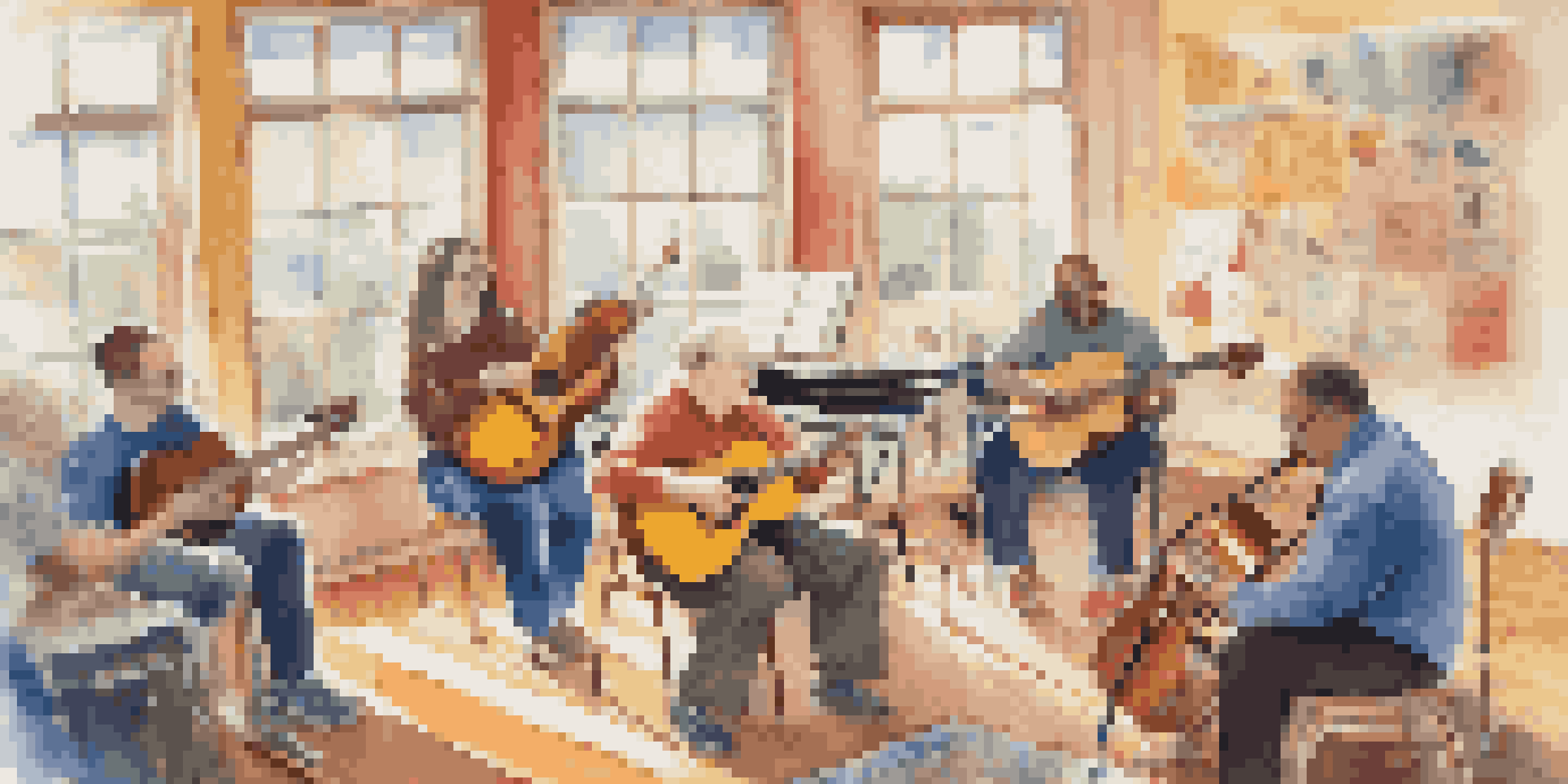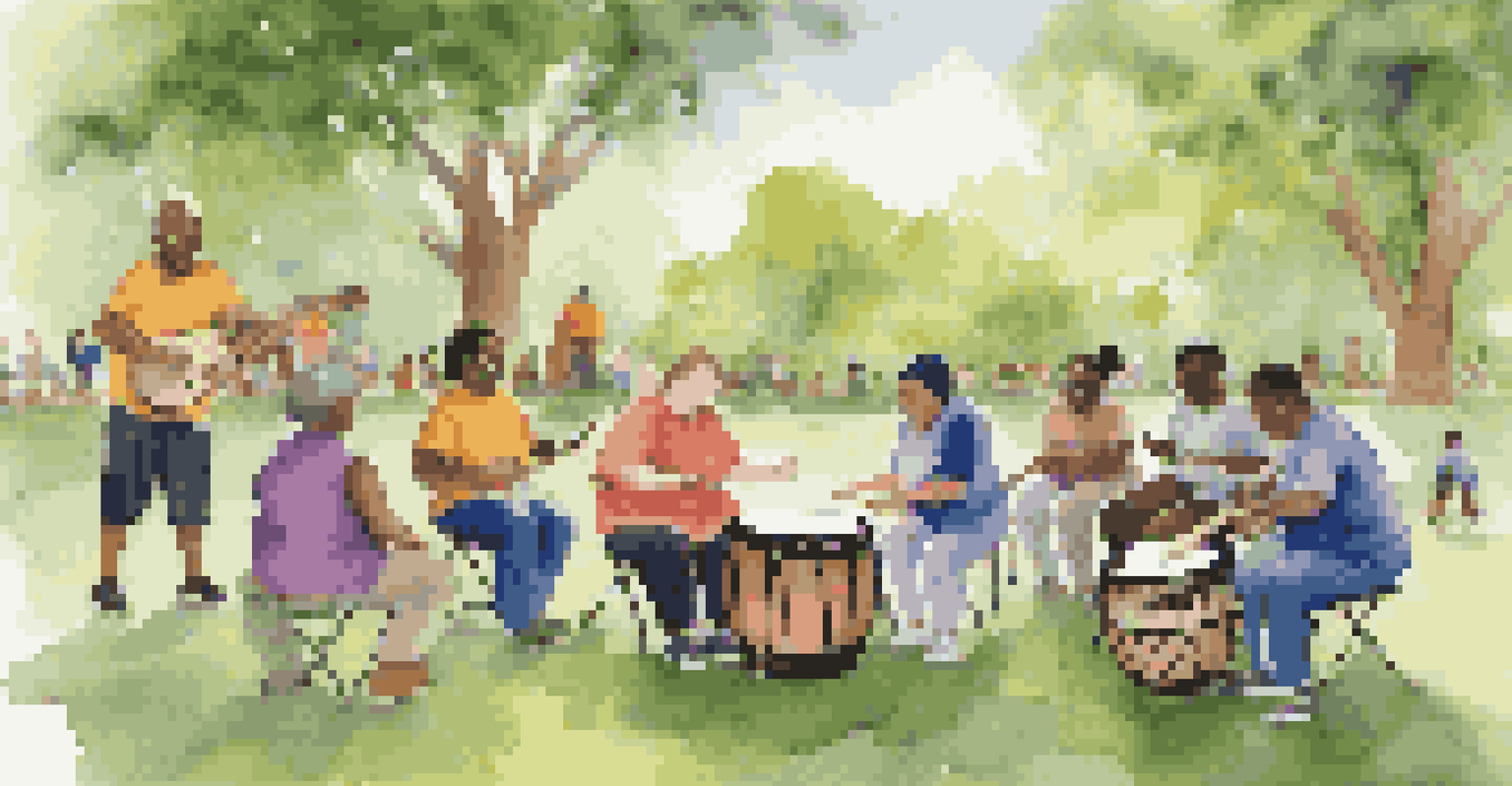The Benefits of Music for People with Developmental Disabilities

Music as a Universal Language for Connection
Music has an incredible ability to transcend barriers, making it a universal language. For individuals with developmental disabilities, music can serve as a medium for expression, even when words may fail. It fosters connections between people, enabling them to interact and share experiences in a meaningful way.
Music can change the world because it can change people.
When a person with developmental disabilities engages with music, they often find joy and comfort, creating an emotional bond with others. This can lead to improved social skills and a sense of belonging, which are essential aspects of human interaction. Through group activities like singing or playing instruments together, individuals learn to communicate and relate to one another.
Consider a music therapy session where individuals come together to create a rhythm. Each participant contributes their unique sound, and in this collaborative effort, they form connections that might not have been possible through traditional communication. This highlights how music can break down walls, fostering a community spirit.
Enhancing Cognitive Skills through Music Engagement
Engaging with music can have profound effects on cognitive development. Studies have shown that music can enhance memory, attention, and even problem-solving skills in individuals with developmental disabilities. This is largely due to the way music stimulates various parts of the brain, promoting overall cognitive function.

For instance, learning to play an instrument involves reading music, coordinating movements, and understanding rhythm, all of which challenge the brain. As individuals practice these skills, they often see improvements not just in their musical abilities but also in their general cognitive skills. This dual benefit highlights the power of music as a learning tool.
Music Fosters Emotional Connection
Music serves as a powerful medium for individuals with developmental disabilities to express emotions and build social bonds.
Think of it like a workout for the brain; just as physical exercise strengthens muscles, musical engagement can strengthen mental faculties. This makes music not only an enjoyable activity but also an effective way to support cognitive growth.
Emotional Expression and Regulation through Music
Music provides a safe outlet for emotional expression, which can be especially important for individuals with developmental disabilities. Many find it challenging to articulate their feelings verbally, but through music, they can convey emotions such as joy, sadness, or frustration in a relatable way. This not only helps in self-expression but also in emotional regulation.
The music is not in the notes, but in the silence between.
For example, listening to calming music can help soothe anxiety, while upbeat songs might elevate mood and energy levels. Music acts as a mirror, reflecting our emotions and helping individuals identify and process their feelings. This emotional awareness is crucial for personal development and mental health.
Furthermore, participating in music-making activities can foster a sense of accomplishment and boost self-esteem. When individuals see their ability to create and share music, they often feel more confident in expressing themselves, leading to improved emotional well-being.
Improving Motor Skills through Musical Activities
Music is not just a feast for the ears; it can also be a powerful tool for improving motor skills. Activities such as playing instruments or clapping to the beat require coordination and physical engagement, which can enhance fine and gross motor skills. This is particularly beneficial for individuals with developmental disabilities, who may struggle with physical tasks.
For instance, drumming can improve hand-eye coordination, while dancing can enhance body awareness and balance. As individuals practice these skills through music, they develop greater control over their movements, which positively impacts their daily activities. This physical aspect of music engagement is often overlooked but is incredibly valuable.
Enhances Cognitive and Motor Skills
Engaging with music improves cognitive functions and motor skills, providing a dual benefit for personal development.
Imagine a group of individuals drumming together; the rhythmic motions not only create beautiful sounds but also serve as a form of physical exercise. This highlights how music can be a fun way to promote physical development while enjoying the process.
Building Social Skills and Teamwork through Music
Participating in music-related activities can significantly enhance social skills and promote teamwork. Whether it's singing in a choir or collaborating on a musical project, these experiences encourage individuals to work together, listen to one another, and build relationships. Music naturally fosters a sense of community, which is vital for social development.
In group settings, individuals learn to take turns, share responsibilities, and communicate effectively with their peers. These skills are transferable to everyday life, helping individuals navigate social situations with greater confidence and ease. The collaborative nature of music-making reinforces the idea of working towards a common goal.
Think of a musical ensemble where each member plays a unique role; together, they create harmony. This mirrors how teamwork functions in everyday scenarios, teaching individuals the importance of collaboration, respect, and understanding in building strong social bonds.
Boosting Self-Esteem and Confidence through Music
Music can be a powerful confidence booster for individuals with developmental disabilities. Achieving milestones, whether it's mastering a song or performing in front of an audience, helps individuals build self-esteem. This sense of accomplishment can have a ripple effect on other aspects of their lives, encouraging them to tackle new challenges.
Participating in music performances can also be a transformative experience. The thrill of sharing their talents with others provides a sense of pride and belonging, reinforcing their identity and capabilities. This exposure to performing can help individuals feel valued and appreciated for who they are.
Boosts Self-Esteem and Confidence
Achieving musical milestones and performing can significantly enhance self-esteem and confidence in individuals.
Consider a scenario where someone takes the stage for the first time; the supportive applause from the audience can affirm their efforts and talents. This moment not only boosts their confidence but also motivates them to continue pursuing their musical journey.
Utilizing Music Therapy for Personalized Support
Music therapy is a specialized field that uses music to address the individual needs of people with developmental disabilities. Therapists work closely with individuals to create personalized music experiences that target specific goals, such as improving communication, emotional expression, or social skills. This tailored approach ensures that each person's unique abilities and challenges are considered.
In music therapy sessions, individuals might engage in activities like songwriting, improvisation, or movement to music. These experiences are designed to promote growth and healing in a supportive environment. The therapist acts as a guide, helping individuals navigate their personal journeys through the power of music.

Imagine a session where a therapist encourages a participant to write a song about their feelings; this not only fosters creativity but also allows for processing emotions in a constructive way. This highlights how music therapy can be a powerful tool for personal development and well-being.